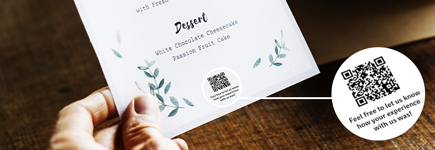Depending on who you ask, the future is somewhere between impossible and very difficult to predict, but you don’t have to have a crystal ball to look into what 2020 holds for the hospitality industry.

By reviewing popular trends from 2019, analysing guest feedback, doing a touch of market research, and reading the leaves from perhaps a few too many cups of tea, we’re feeling confident in our predictions for what the coming year will hold for hoteliers and their guests!
Sustainability is here to stay
No, this isn’t deja vu, though we can understand why it may feel like it. Sustainability is nothing new, and while we could say that the ‘trend’ isn’t going anywhere, that would frankly be untrue. It’s moving forward and gaining momentum. Climate change is becoming increasingly hard to deny, Greta Thunberg is Time magazine’s Person of the Year, and travellers are more focussed than ever on finding a property that will meet their sustainability standards. In fact, Booking.com’s latest sustainable travel report saw 55% of global travellers determined to make sustainable travel choices, but struggling to find companies that meet those needs.
While property groups like Queensway Group’s Point A Hotels and InterContinental Hotels Group are already taking active steps to meet their guests’ requests for less plastic in both their restaurants and the toiletries that they provide in their rooms, 2020 is going to see further efforts being taken to reduce properties’ environmental footprints.
55% of global travellers are determined to make sustainable travel choices in 2020, but struggle to find companies that meet their sustainability needs — Booking.com
While many hoteliers may be familiar with the Internet of Things (IoT) when it comes to improving accessibility and offering guests a more personalised experience at their property, the coming year is expected to see many hospitality professionals also looking to IoT for answers when it comes to sustainability. As Trivago explains, “Smart Hotel features let the guests and staff better regulate energy consumption and support pro-environment and sustainability initiatives.”
Restaurants, in the meantime, will continue to focus on local suppliers, top to tail cooking, and providing more extensive plant-based food options, as Boutique Hotel News points out that “consumerism is all-the-more oriented towards natural and organic products. So, in keeping with the green theme, menus are adapting to better serve the modern traveller.” Liutauras Vaitkevicius, formerly of Good Hotel London, found that this was certainly the case when it came to their socially conscious guests. “A lot of people nowadays want healthy food, food that has a soul, food that is locally sourced,” he explains.
Developing and nurturing teams through training and opportunities
We’ve said it before, and we’ll say it again — your team are the front line of guest experience. Attracting great talent, and keeping your team engaged and motivated is set to be one of the key ways hospitality companies can set themselves apart in the future.
According to Gallup’s research, a highly engaged workforce could see you outperforming your competitors by as much as 147%, but motivating your employees and keeping them engaged is hardly an easy feat. As Adrienne Hanna explains in her article for Right Revenue: “As an industry we need to learn to invest in our teams, reward in new ways – which often isn’t monetary but could take the shape of training, more flexible working, removing zero-hour contracts – all of which will benefit the industry as a whole. We are nothing without the people around us, so 2020 is the time to show that.”
“46 percent of employees say their company’s training courses make them more likely to stay.” — EHL Advisory Services
And Adrienne isn’t the only one to realise the importance that developing and nurturing your team is going to play in the year to come. Jochen de Peuter, a consultant at EHL Advisory Services, recently looked at the impact of training on staff satisfaction levels, finding that “46 percent of employees say their company’s training courses make them more likely to stay. Employees show increased satisfaction levels, feel appreciated, have better internal relationships, feel challenged and are more efficient in executing the job.”
The Coaching Inn Group has long held this to be true, and uses the feedback that they get from their guests to show them where training may be necessary, while encouraging a sense of competitive camaraderie between their teams, and motivating staff members to go the extra mile in providing excellent customer service and guest experiences.
"We run an incentive called ‘Hero of the Month’ where our GMs nominate a member of their teams to win a £50 bonus each month," explains Group Operations Manager, Adam Charity. "It could be any member from any department. Then all the ‘Heroes’ from throughout the year are called into a group at the Coaching Inn Group awards and the overall ‘Hero’ of the group will win a trip… The GuestRevu comments and the feedback help push the ‘Heroes’ to the top of that list when the GMs are looking to nominate."
It’s going to be personal
Yet another trend that we’ve seen before, but is picking up steam — no one wants to feel like just another number or head in a bed. Everyone wants to feel that their experience was unique and meaningful, and it applies from the start of their research, to their recommendation of your property.
“33% of consumers who abandoned a business relationship last year did so because personalisation was lacking.” — Accenture
As Bain & Company found in their research in collaboration with Google: “In a world of infinite paths to purchase, brands that target typical behavior risk missing the vast majority of travelers and wasting advertising dollars.”
And there is a lot of scope available when it comes to personalisation, as many companies are trying to offer personalised experiences, but few are getting it right according to Accenture, who point out that “33% of consumers who abandoned a business relationship last year did so because personalisation was lacking.”
So where should you start? First and foremost, it’s important to get the right information for personalisation, and make decisions as to where you are going to focus your efforts. There are countless opportunities for:
- Personalising your advertising to encourage potential guests to click your book button
- Customising your messaging for those who have already booked
- Putting together personalised promotions for past guests
- Responding to reviews in a way that distinguishes one guest’s experience from every other
And those are just naming a few ways that you can take personalisation on at your properties! Taking on all of these personalisation projects at once, however, could easily lead to confusion, frustration and burn out. Pick a personalisation project for 2020 — after all, it’s not going anywhere anytime soon.
Companies will be defining their online personas
It should hardly come as a surprise that any company’s potential customers are on social media. Whether they’re using Facebook, Twitter, LinkedIn, Instagram, SnapChat, Pinterest, or one of countless other platforms, you have an opportunity to reach potential guests by having a social media presence. But in 2020, simply having a profile is not going to be enough.
“Thanks to increased social networking among consumers and the influence of social sites, it has become a business imperative for hotels to embrace social media. In order to get in front of their consumers, hotels need to continue publishing relevant content and distinguishing themselves from their competitors.” — Trivago
Posting generic content on every platform is no way to engage potential, past and present guests. Rather, 2020 is going to be the year when hospitality businesses will be defining their online personas to encourage guests and customers to interact with them, sharing memories, great reviews and more! As Trivago explains: “In order to get in front of their consumers, hotels need to continue publishing relevant content and distinguishing themselves from their competitors.”
Creating an online persona that your audience can relate to will be invaluable in setting yourself apart, and can even help you to address what Bain & Company, in collaboration with Google, refers to as your guests’ raw needs: “Emotions shape bookings in powerful ways. When customers search for a room, they are often doing something more profound, such as reconnecting with a friend, exploring a new culture, realizing a bucket list dream or escaping from the strain of daily life for a while. Travel brands often miss these raw needs because, by the time the traveler reaches them, the process has become more price- and promotion-driven than inspirational.”
“Emotions shape bookings in powerful ways. When customers search for a room, they are often doing something more profound, such as reconnecting with a friend, exploring a new culture, realizing a bucket list dream or escaping from the strain of daily life for a while.” — Bain & Company
By showing your guests that you are able to help them reach their goals from a travel experience, by offering more than just a place to rest their heads, and highlighting the experiences that previous guests have had with you, you have an opportunity to use social media to encourage new visitors to book. And those bookings themselves could even be more profitable, as research by the University of Michigan has shown that customers spend 19% more after joining a company’s online community.
Feedback won’t wait until after a stay
Getting feedback from your guests is essential to improving the experience that you provide, making operational decisions, and so much more. All you have to do is look at our client success stories to get a sense of the tremendous impact that consistent guest feedback can have on a property.
But in 2020, it’s going to be important to let your guests give you feedback where, when and how it’s easiest for them, and according to The Dunloe’s latest infographic, ‘Who is the Hotel Guest of 2020?’, the time for feedback in the year ahead is likely to be while your guests are with you: “Guests will no longer wait until they’re checking out to provide feedback on their stay. They want to express their feelings in the moment, for better or worse.”
We couldn’t agree more, which is what we believe makes our any-time surveys so popular: they provide guests with the opportunity to give their feedback by scanning QR codes, which can be placed around your properties, on your invoices, menus and emails, at your reception desk and more, or even using kiosks and tablets, configured to show your survey. These give guests the opportunity to give you their feedback when they want to, using their own devices, without needing to capture email addresses, and gives GuestRevu clients the opportunity to get feedback from guests before they arrive, and during their stays as well as after they leave.

If 2020 is anything like the year that has passed, we’re sure that it’s going to rush by in a flash, but at least with these predictions in your back pocket (where we assume you keep your cellphone, or your handy divining crystal), you’ll be prepared to face whatever it may hold for your property.




